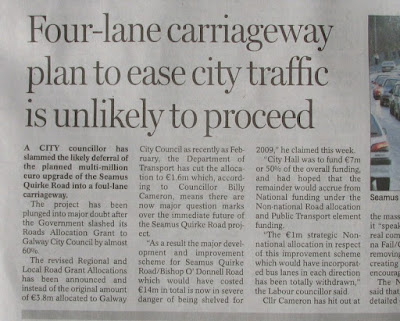
He writes:
The road in question is a nice little jam-generator, so it's a particularly apt typo. I am a little conflicted, because it's a good newspaper, but amusement trumps politics again.
Thanks, Stan!
This is JD's blog about language use, journalism, and media old and new.

The road in question is a nice little jam-generator, so it's a particularly apt typo. I am a little conflicted, because it's a good newspaper, but amusement trumps politics again.
Business Secretary Lord Mandelson said:
"This is targeted action with a capped budget and for a limited time, designed to boost the whole motor trade. This will ensure that the benefits of a scrappage scheme are balanced with the needs of other sectors of the car industry such as the second hand market, maintenance and repair businesses, and other industries that produce consumer durables or on the taxpayer.
If it's something you can see, then you spell it with a 'c'.

"Panamax" ships are of the maximum dimensions that will fit through the locks of the Panama Canal. This size is determined by the dimensions of the lock chambers, and the depth of the water in the canal. An increasing number of ships are built precisely to the Panamax limit, in order to transport the maximum amount of cargo in a single vessel.

While I have power phrased Mr Wood somewhat, the system's benefits have already been seen


Go on, you little slacker! Go on, you idle, worthless little boy! The whole trouble with you is that you're bone and horn idle. You eat too much, that's why.

However, those looking for green shoots of recovery should be weary
The rival team's amazing Body Rocka - a slab of plastic with no discernible purpose - romped to victory thanks to four-eyed Lorraine Tighe's impressive business pitch.

The stop is packed with the kind of facilities that any sane driver and operator would want near one of the major boarder crossings in Europe

Sherlock Holmes and Dr Watson go camping and pitch their tent under the stars. In the middle of the night, Holmes wakes his companion up and says: "Watson, look up at the stars and tell me what you deduce." Watson says: "I see millions of stars and maybe quite a few planets among them. It may be true that a few of the planets are quite like Earth and there might be life on them." Holmes replies: "Watson, you bloody fool*! Somebody has stolen our tent!"
*Bloody is a medium-strong swear word, used to give emotional emphasis to something that you are saying. It should not be used in polite situations. For polite conversation, substitute: You stupid idiot!
South East London is the home of Uniqulture (multi-culture without divisions); it is at the hub of the thriving, arts powered explosion in creativity.
Senior sustainability officer for air quality in Camden Borough
